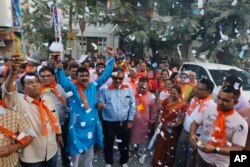India will hold a series of state elections that will test the popularity of Prime Minister Narendra Modi in the wake of a controversial currency ban that he has pitched as a major step to battle corruption, but which led to huge cash shortages in the country.
The polls in five states - Punjab, Uttar Pradesh, Uttarakhand, Manipur and Goa - will start February 4 and be staggered over more than a month.
Announcing the polls on Wednesday, Chief Election Commissioner Nasim Zaidi said that “over 160 million voters will take part in these polls, that is the size of this exercise.”
Being held halfway through the prime minister's term, the polls will decide whether his sudden move to scrap 86 percent of the currency is endorsed by voters or whether it alienated millions of poor people who were the worst hit by the cash shortages that have still not eased.
Uttar Pradesh critical
The most crucial for Modi is the battleground state of Uttar Pradesh, the country’s most populous region that his Hindu nationalist Bharatiya Janata Party (BJP) hopes to wrest from a regional party.
Political analyst Neerja Chowdhury in New Delhi says the polls will set the tempo for the 2019 general elections. “If he wins Uttar Pradesh, it will send a signal of political stability to investors and might help kick start the economy, which has certainly slowed down.”
But she warns the reverse will happen if he loses. “Then he is on a slippery, slippery slope. Knives many be out for him within his own party, certainly the opposition is going to be emboldened.”
Risky currency move
Modi’s radical and politically risky move of banning high value notes in a bid to flush out hoards of illegal cash was taken with just a handful of trusted advisors, according to reports.
It initially won the backing of poor and middle class people who hailed it as the boldest step taken by a strong leader to stamp out graft – a promise that helped sweep him to power in 2014.
But there are worries that popular support slipped away because the measure was poorly implemented. For weeks, people waited in huge lines for new notes while many lost jobs due to cash shortages that slowed down the informal sector, which employs millions.
Rural areas suffering
The cash crunch has been the most acute in rural and remote areas, where two thirds of India's population lives and where the outcome of elections is often decided.
Success in the elections, particularly in Uttar Pradesh, would also help the BJP improve its position in the upper house of parliament, making it easier to press ahead with economic reforms. The BJP has faced hurdles passing legislation because it is in a minority in the upper house.
The Election Commission has also announced new measures to encourage women and the disabled to vote. It said it will provide wheelchairs and ramps at polling booths, staff some entirely by women, and provide separate facilities for them in areas where they do not want to mingle with men.











